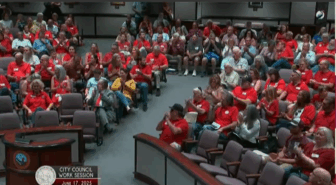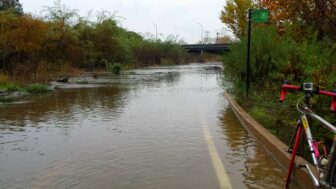Guest post from Elisabeth Hoffman of HoCo Climate Change
When I march Thursday for a fracking ban, I’ll be calling on Maryland to heed the warning of the canary that is Pennsylvania. And West Virginia, Colorado, Oklahoma and the others.
No state has gotten fracking right, because fracking can’t be made safe or even safe enough.
Everywhere this industry goes, residents rise up to defend their homes and farms, their children and pets, and their forests and towns from the noise and lighting, the truck traffic and ruined roads, the polluted air and water, and even earthquakes. No regulations are sufficient to corral the fracking industry.
Other states let industry experiment on their communities. From studies in fracked areas, we know that fracking is linked to increases in asthma attacks; preterm births and high-risk pregnancies; anxiety, fatigue, migraines and sinus ailments; and hospitalizations for heart and neurological problems. New research finds a link between fracking and a form of childhood leukemia. Thanks to documents from a freedom of information request, we are also learning that Pennsylvania officials suppressed thousands of residents’ complaints about water contamination and other problems. We know too that much damage remains hidden in legal settlements: Industry pays up only after residents take a vow of silence about what happened.
Along with the fracking come the pipelines and compressor stations and export factories that bring yet more destruction to towns, fields and forests; spikes of toxic pollution, and threats from explosions. Communities must fight not only industry but the rubber-stamping Federal Energy Regulatory Commission, which has cozy ties to industry and refuses to take into account the cumulative damage from these fracked-gas projects. In Pennsylvania, for example, residents are rebelling against the 350-mile Mariner East pipeline that will take fracked gas from the Marcellus Shale to export for Scotland to make plastics, of all things; the 124-mile Constitution pipeline that slashed through a sugar maple forest, before it was denied key approvals; and the nearly 200-mile-long Atlantic Sunrise pipeline, slated to cut through preserved farmland and communities in Lancaster and four other counties. Lancaster-area opponents have built The Stand, a wooden watchtower in the path of construction that will be the base for peaceful resistance should Williams Corp. show up.
My county, Howard, is one of only four in Maryland with no shale gas underground. Yet even here, fracking is elbowing its way in. Williams plans to expand and modernize a half-century-old compressor station to connect with that contentious Atlantic Sunrise project. And so we are joined quite literally to our friends fighting this pipeline. Maryland, too, must make a stand. We can’t let the fracking industry invade our state.
Of course, along with the fracking and the infrastructure comes the climate-disrupting methane, which is on the rise in fracked Pennsylvania. Fracked gas is no bridge fuel for our climate emergency.
Fracking and building pipelines is like installing more phone landlines – but with the added dangers. We need to be done with these antiquated fossil fuels, not doubling down on them.
What’s clear is that cheap fracked gas (and oil) is an oxymoron from industry’s playbook of alternate facts. Industry won’t pay for the lifetime of medical bills. Or clean up the air, soil and water. Or compensate for carved-up forests or climate chaos. Or monitor the toxic water it leaves underground. Or cover the losses to the tourism industry and property values. These costs and much more remain off the industry’s books, instead showing up in our community and household balance sheets.
Even the prospect of fracking is discouraging investment in Western Maryland’s tourism businesses. Industry is fighting this ban too hard – with ads and in the state legislature – for us to be persuaded (as some have claimed) that it has little interest in Maryland. Perhaps industry just doesn’t want to be told what to do.
Yet that’s exactly what we must do. Maryland is where we say no to the whole fracking package. Instead, we’ll invest in renewables and efficiency. As a friend in fracked Pennsylvania says: “Good neighbors don’t ask you to put yourself in harm’s way so they can turn a profit. Good neighbors don’t engage in practices that may have long-term consequences for the health and welfare of the community. Good neighbors are neighborly. They don’t knowingly pollute the air, soil and water. They don’t ruin roads and disturb tranquility. Good neighbors are invested in the community, less interested in extracting wealth than building lasting bonds. Good neighbors leave a place better for having been there.”
Join me this Thursday in marching to ban fracking in Maryland.
##





